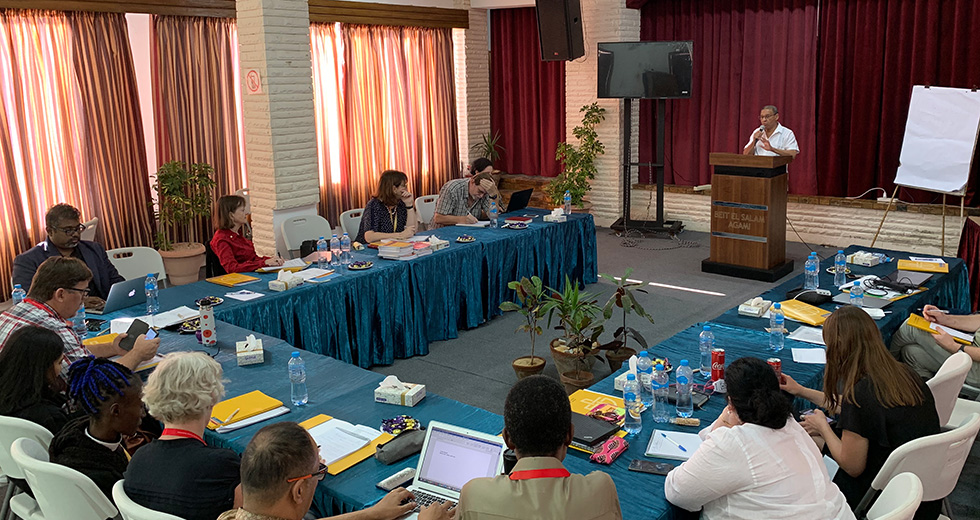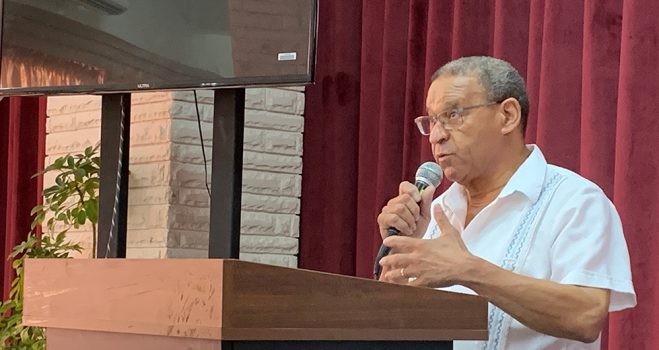“Struggles for justice and human dignity are going on everywhere,” said Allan Boesak, in a keynote address delivered at a strategic planning meeting last week outside of Alexandria, Egypt.
“Pretending that a struggle is not necessary, or that there are no struggles already going on, is a lie. And so was pretending that fighting oppression was not a duty for those who believed in a just, compassionate God,” he said. “Heirs of the Reformed tradition know even more. Calvin teaches us that God deems Godself violated in the wounds inflicted upon human beings created in God’s image.”
“God becomes the poor and oppressed,” he said.
Framing the current situation as a struggle against “global apartheid which includes socio-economic exploitation and inequalities, political and social exclusion, racial and ethnic discrimination, as well as gender injustice and heteronormative oppression,” Boesak turned to John Calvin for insights.
“Calvin understood that full humanity, that is, meaningful life as free children of God endowed with inalienable rights to worthiness, justice, equity, having choices, and dignity, cannot be realized while people remain in the chains of social hesitation, economic deprivation and political ambiguity. It requires freedom,” said Boesak.
“That is why, on numerous occasions, Calvin speaks of tyranny, that is, political oppression, economic exploitation, and depriving the people of their rights and their choices through unjust laws and practices, as totally unacceptable, as rebellion against God, a denial of the rights of the powerless and a denigration of the rights of God,” he said. “And that is why Calvin insists that to not rise up in resistance against that oppression is ‘cowardice.’ Rising up against it is a sacred duty.”

Boesak, a past president of the World Alliance of Reformed Churches (a predecessor organization of the World Communion of Reformed Churches (WCRC)), is a South African theologian, human rights activist and the first holder of the Desmond Tutu Chair for Peace, Justice and Reconciliation Studies at Christian Theological Seminary and Butler University (Indiana, USA).
WCRC General Secretary Chris Ferguson agreed: “When we gather from around the world, we bring our contexts with us. The weight of the world is entirely upon us, and we must respond to the massive threat to life, we must respond to the creator God, making sacred the presence of God in our midst, in all our contexts.”
He added that discerning, confessing, witnessing and being reformed together leads the WCRC as a global koinonia to work within five strategic areas: 1) cultivating a just communion, 2) covenanting for justice, 3) doing theology for transformation, 4) engaging God’s mission in a context of crisis and 5) working with all the partners God provides.
“As a global koinonia called to communion and committed to justice, we must continue to strengthen our relationships with each other even as we grow our work for a greater global impact,” Ferguson said, emphasizing that, “It is all about becoming what we’re to become, not just doing what we’re to do. ”
Nady Labib, moderator of the Synod of the Nile, Evangelical Church of Egypt, said, “The cries of the poor, the oppressed, the marginalized, the forgotten and silenced point to the destructive arrogance of the powerful and the need for the in-breaking reign of God in Christ, where there is justice and inclusion in a life-giving community.”
WCRC President Najla Kassab pointed out the importance of theological foundations. “Carrying this theological understanding of why we’re doing our work is very important. The more we are disturbed, the better we do justice,” she said.
Members of the WCRC Reference Groups were meeting at the Beit El Salam Retreat Centre, hosted by the Synod of the Nile, to review progress on the strategic plan’s implementation and decide on upcoming activities and projects for the next several years.
The Reference Groups will report through the Strategic Plan Programme Group to the WCRC Executive Committee at its meeting in May in South Africa.


